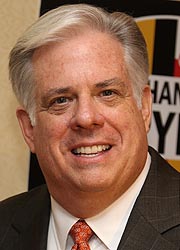
Potomac Economics found that the average transfer price of CO2 allowances during the first quarter of 2015 was $5.46, approximately 5% higher than in the prior quarter and 41% higher than the first quarter of 2014. The clearing price in Auction 27, held on March 11, was $5.41, which was consistent with secondary market prices leading up to the auction.
RGGI Reorganizes Executive Board
A Connecticut regulator has assumed the chair of the Regional Greenhouse Gas Initiative.
Katie Dykes, deputy commissioner for energy at the Connecticut Department of Energy and Environmental Protection, became the new chairwoman on Friday, replacing Kelly Speakes-Backman. The executive committee includes Joseph Martens, commissioner of the New York Department of Environmental Conservation, vice chair; Thomas Burack, commissioner of the New Hampshire Department of Environmental Services, secretary; James Volz, chairman of the Vermont Public Service Board, treasurer; and David Small, secretary of the Delaware Department of Natural Resources and Environmental Control, member-at-large.
Biographies of executive committee members and of the entire RGGI board are available here.
More: RGGI
CONNECTICUT
Legislature Bans New Variable-Rate Contracts
State lawmakers have overwhelmingly approved a bill that would ban power companies from signing up residents for variable-rate electricity contracts. The measure, which would take effect Oct. 1, now goes to Gov. Dannel P. Malloy, who is expected to sign it into law.
The legislation attempts to quell a source of consumer complaints against third-party suppliers who seek to switch residents from the state’s two utility-managed standard-generation offers.
Although the bill would prohibit suppliers from signing up customers for variable-rate plans, it does not ban variable rates outright. The majority of residents with variable electric plans do not sign up for such plans; they are rolled over into a variable plan by their suppliers at the termination of their fixed-rate plans. The legislation requires regulators to address this issue.
More: Hartford Courant
DELAWARE
Proposed Gas Rate Changes Would Increase Larger Users’ Cost
The state’s chemical industry is fighting a proposed Delmarva Power & Light natural gas rate plan that would lower costs for residential customers while increasing charges by 6 to 30% to larger users. The utility proposed the changes after a consultant for the Public Service Commission said last year that some gas customers appear to be subsidizing larger, bulk purchasers. “A potential 25% natural gas cost increase to Delaware businesses is not the message that the state should be sending,” Josh Young, executive director of the 14-member Chemical Industry Council of Delaware, said in a letter to the PSC. For residential customers, the changes would mean a 1.4%, or $1.75, decrease in bills for an average winter month.
A public workshop is scheduled for Wednesday in Wilmington. The PSC said a decision could come by the end of the year.
More: The News Journal
ILLINOIS
Exelon’s Nukes in Limbo as Legislature Ignores Bill
Three clean power bills — including one backed by Exelon to support three of its struggling nuclear plants — have stalled in the General Assembly. Part of the legislature’s delay relates to the surprise results of MISO’s Planning Resource Auction, which is expected to result in higher rates next month. (See related story, Public Citizen to FERC: Investigate Dynegy Role in MISO Capacity Price Jump.) “There are an awful lot of questions, some of which arose after the auction,” said Steve Brown, spokesman for House Speaker Michael Madigan.
On Monday, in an 8-K filing with the Securities and Exchange Commission, Exelon said that it doesn’t expect the legislature to pass its proposed Low Carbon Portfolio Standard during the current session. The company has said that without the revenue the legislation would bring in, it might have to close the plants in Byron, Quad Cities and Clinton. (See Exelon-Backed Bill Proposes Surcharge to Fund Illinois Nukes.)
In April, Exelon Executive Vice President Joseph Dominguez had said the company wouldn’t wait until the fall veto session for an answer. Last week, however, the company appeared to be more flexible. “We remain open to participating in any and all discussions designed to enact a legislative package,” the company said.
More: Crain’s Chicago Business
INDIANA
NIPSCO to Pay Back $1 Million to Customers
Northern Indiana Public Service Co. will reimburse customers nearly $1 million and reapply for any rate increases under a settlement reached with the Utility Regulatory Commission. The settlement, a response to a state Court of Appeals ruling that overturned the IURC’s previous approval of NIPSCO’s seven-year infrastructure modernization plan, will result in refunds averaging about $6 per customer.
The settlement covers only NIPSCO’s electric customers. A separate plan covers the company’s gas customers.
The Office of Utility Consumer Counselor and some of NIPSCO’s industrial customers appealed the company’s seven-year plan, saying they were concerned about double recovery and the accuracy of the company’s rate-based investments.
More: The Journal Gazette
MAINE
Committee Thwarts Energy Proposals

The Legislature’s Energy, Utilities and Technology Committee on Thursday scuttled Republican Gov. Paul LePage’s energy proposals in a 7-6 party line vote.
LePage’s proposals would have made sweeping changes in longstanding state energy policies designed to encourage renewable energy development and to fund efficiency programs. They included a repeal of the state’s renewable portfolio standard and a measure that would require utilities to provide a credit “backstop” to help large businesses expand natural gas pipeline capacity. One bill would cut conservation programs by returning a larger share of revenue from a regional carbon credit auction.
LePage’s energy director, Patrick Woodcock, said that he hoped some elements of the governor’s proposals could be resurrected this year.
More: Portland Press Herald
MARYLAND
Two-Year Fracking Ban Enacted as Hogan Declines Action

Gov. Larry Hogan last week allowed a state-wide fracking ban to take effect without his signature.
When the ban passed in both houses of the General Assembly with a veto-proof majority, Hogan said he would neither sign the law nor veto it. The deadline for action passed Friday night, and the ban will go into effect on Oct. 1.
Sponsors of the bill said the ban would allow scientists the chance to study the potential environmental impacts of fracking. Hogan had called fracking an “an economic gold mine” during his 2014 election campaign. But since taking office in January, he had been quiet on the issue.
More: Inside Climate News
MICHIGAN
Protesters Interrupt Snyder; Call for Action on Enbridge Pipeline

The protesters are calling for the closure of the 61-year-old Enbridge Pipeline No. 5, which carries crude oil from northern Wisconsin to southern Ontario beneath the Straits of Mackinac. They cited studies from an environmental nonprofit that question the pipeline’s structural integrity.
Pipeline safety is a looming issue, especially in Michigan. Just last week Enbridge reached a $75 million settlement with state environmental regulators related to a 2010 spill into the Kalamazoo River. Cleanup for that spill, which is ongoing, has already cost the company $1.21 billion.
More: MLive
MINNESOTA
PUC Approves $250 Million Geronimo Energy Solar Project

The sites for the Aurora Solar Project are mostly in rural Minnesota near established transmission lines. The power will be sold to Xcel Energy. It will be the largest solar installation in the state and increase the state’s solar output by a factor of seven. Surprisingly the project beat several natural gas projects in the bidding process.
“This signals that something big is happening in solar energy in Minnesota,” said Michael Noble of Fresh Energy, a non-profit solar advocacy group. The PUC rejected three other sites because of local zoning rules.
More: Star Tribune
NEW JERSEY
Literal Power Struggle Keeps Revel Casino from Opening

Glenn Straub, the developer who bought the casino, agreed to a tentative deal with ACR to keep the building minimally powered while he looks for a way to either connect into the Atlantic City Electric grid or tap into the defunct Showboat casino next door, which is now owned by Stockton University. Straub’s company, Polo North Country Club, is battling ACR over fees. The state’s second tallest building was without power for three weeks after ACR pulled the plug April 9 following the bankruptcy sale. State officials have ordered the two companies to keep the building’s fire-suppression powered. The parties also are dueling over who owns $40 million in electric equipment that connects ACR to the complex.
More: Press of Atlantic City
NEW YORK
NYISO Changes Consumer Impact Analysis
NYISO is changing its Consumer Impact Analysis, a process that evaluates the impact of market administration projects and rule changes, to improve transparency and provide more opportunities for stakeholder input.
The Consumer Impact Analysis evaluates the potential impact of changes based on reliability, environment, cost and transparency. The revised process will give stakeholders notice at the outset of a market design initiative if a project is expected to have a major consumer impact. Stakeholders will receive a description of the methodology to be used in the impact analysis, the results of which will be presented at least 30 days prior to stakeholder votes.
The changes incorporate feedback received from end-use consumer representatives, other market participants and policymakers.
More: NYISO
NORTH CAROLINA
Fearing Fracking, Residents Protest Core Drilling
Some residents in Walnut Grove, a town of about 1,500 located on top of potential shale gas reserves, are objecting to a state plan to conduct core sampling on publically owned land to explore for natural gas.
“The community we love is in the middle of a David-and-Goliath battle with big industries that seem to care very little about the people in the area we call home,” town resident Tracy Brown Edwards said. Walnut Grove already hosts the third-largest coal ash dump in the state.
The legislature approved fracking last year but almost immediately issued a moratorium while legal challenges are prepared.
More: Think Progress
OHIO
PUCO Delays Decision on AEP’s Coal Rider Until PJM Capacity Auction, FERC Ruling
The Public Utilities Commission said it would wait until after the PJM capacity auction to rule on American Electric Power’s request to guarantee rates from its aging coal plants in return for a vow to keep them operating.
The commission in February approved most of AEP’s three-year security plan but rejected the company’s guaranteed-income request. Two other utilities — FirstEnergy and Duke Energy — have similar requests pending before the commission.
The commission said it wants to see the results of the PJM Base Residual Auction, and the final outcome of the state’s plan to meet the Environmental Protection Agency’s Clean Power Plan, before ruling. The auction for 2018-19 should have taken place in May, but it was delayed to give the Federal Energy Regulatory Commission time to approve PJM’s Capacity Performance proposal. That reform is expected to benefit coal plants in PJM, including those in AEP’s fleet.
More: Argus
OKLAHOMA
Gov. Mulls Ban on Fracking Bans After Texas Passes Similar Law
A law prohibiting local government bans on fracking is awaiting the governor’s signature.
The Senate voted 33-13 on the bill — which also prohibits local bans on wastewater disposal wells — at the urging of the oil and gas industry. The industry has faced increased pressure from communities where fossil fuel opponents have made headway after Denton, Texas, last year voted to ban fracking within town limits. Denton is located in the heart of the Barnett Shale region.
The industry argues that regulation of oil and gas development comes under the aegis of state or federal regulators, not local officials.
More: KOCO; US News & World Report
PENNSYLVANIA
Coal Alliance: Benefits of Clean Power Plan Overestimated

Washington needs to consider the effect of forcing coal plants into retirement, Pippy told the Pittsburgh Business Times. “There’s no place to sell the coal right now,” he said.
Last week, Murray Energy and Alpha Natural Resources announced layoffs of more than 2,000 people. Alpha plans to close its Emerald mine in Greene County by the end of the year. Consol Energy has said it will reduce its state mines to a 32-hour workweek.
More: Pittsburgh Business Times
Wolf Nominates Environmental Professional to Seat on Public Utility Commission

“Andrew Place brings the knowledge and expertise to help advance my vision for the PUC, and I am pleased to nominate him,” Wolf said. “We must ensure there is a balance between consumers and utilities. We also have to develop Pennsylvania’s abundance of energy resources to make sure we have the infrastructure to support the natural gas and other energy industries.”
Place has degrees in economics and public policy and worked as a research fellow at Carnegie Mellon University’s Department of Engineering and Public Policy, becoming an expert in carbon capture and sequestration.
More: PennLive
TENNESSEE
Rebates Coming for Drivers of Electric Vehicles
Qualifying electric vehicles bought or leased and registered in the state will be eligible for rebates of up to $2,500 beginning June 15.
The total pot of money available for consumers is $682,500, and it will be doled out on a first-come, first-served basis. Drivers of zero-emission battery electric vehicles will get $2,500. Those that lease or buy plug-in hybrid electric vehicles will receive $1,500.
Dealerships will be responsible for filing a claim and then will give the money to their customers.
More: WCYB
WISCONSIN
Xcel Energy to Ask for Fixed Charge Increase
Xcel Energy is asking state regulators to raise its fixed monthly fee for electricity and natural gas customers, rather than seeking an increase in usage rates.
Xcel wants to increase the fixed monthly customer charge from $8 to $18. The company said it would decrease its usage rate by about 0.7 cents/kWh. The increases would boost electricity revenue 3.9% and gas revenue 5%.
Regulators in neighboring Minnesota this year rejected a similar request by Xcel to increase the customer charge. Customer advocates said fixed-fee increases penalize smaller users and reduce the incentive to conserve. The company argues that bigger fees provide for a more equitable recovery of costs to maintain distribution networks. “The nature of the electric grid is going to change,” an Xcel executive said. “The grid is there and costs something regardless.”
More: LaCrosse Tribune
MANITOBA
Manitoba Hydro Seeking 3.95% Rate Increase

Keeyask is a 695-MW hydro station being built on the Nelson River. When completed it will be the company’s fourth largest hydro station.
More: CBC News


